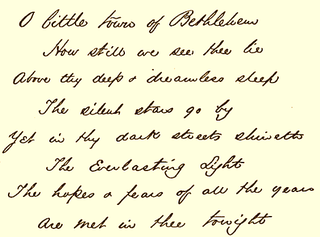Related Research Articles
The Pomp and Circumstance Marches, Op. 39, are a series of five marches for orchestra composed by Sir Edward Elgar. The first four were published between 1901 and 1907, when Elgar was in his forties; the fifth was published in 1930, a few years before his death; and a sixth, compiled posthumously from sketches, was published in 1956 and in 2005–2006. They include some of Elgar's best-known compositions.

"In the Bleak Midwinter" is a poem by the English poet Christina Rossetti, commonly performed as a Christmas carol. The poem was published, under the title "A Christmas Carol", in the January 1872 issue of Scribner's Monthly, and was first collected in book form in Goblin Market, The Prince's Progress and Other Poems.

"O Little Town of Bethlehem" is a Christmas carol. Based on an 1868 text written by Phillips Brooks, the carol is popular on both sides of the Atlantic, but to different tunes: in the United States, to "St. Louis" by Brooks' collaborator, Lewis Redner; and in the United Kingdom, Canada, and Ireland to "Forest Green", a tune collected by Ralph Vaughan Williams and first published in the 1906 English Hymnal.

"In dulci jubilo" is a traditional Christmas carol. In its original setting, the carol is a macaronic text of German and Latin dating from the Middle Ages. Subsequent translations into English, such as J. M. Neale's arrangement "Good Christian Men, Rejoice" have increased its popularity, and Robert Pearsall's 1837 macaronic translation is a mainstay of the Christmas Nine Lessons and Carols repertoire. J. S. Bach's chorale prelude based on the tune is also a traditional postlude for Christmas services.

"The Wind at Dawn" is a poem written by Caroline Alice Roberts, and set to music by the English composer Edward Elgar in 1888.

"The Pipes of Pan" is a poem by Adrian Ross set to music by the English composer Edward Elgar, being completed on 5 June 1899.
”Through the Long Days” is a song written by the English composer Edward Elgar in 1885 as No. 2 of his Op. 16, Three Songs. The words are from a poem by the American writer and statesman John Hay.
"Follow the Colours" is a marching song written by the English composer Edward Elgar in 1907, with words by Capt. William de Courcy Stretton. The song is for male voice solo with an optional male voice chorus, accompanied by piano, orchestra or military band.

”Inside the Bar" is a song written in 1917 by the English composer Edward Elgar, with words by Sir Gilbert Parker.
"The Immortal Legions" is a poem written by Alfred Noyes, and set to music by the English composer Edward Elgar. It was one of the songs written to be performed in the Pageant of Empire at the British Empire Exhibition on 21 July 1924.
"Sailing Westward" is a poem written by Alfred Noyes, and set to music by the English composer Edward Elgar. It was one of the songs written to be performed in the Pageant of Empire at the British Empire Exhibition, Wembley Park, on 21 July 1924.
"A Song in Storm" is a poem written by Rudyard Kipling (1865-1936).

The Fringes of the Fleet is a booklet written in 1915 by Rudyard Kipling (1865–1936). The booklet contains essays and poems about nautical subjects in World War I.
Carillon is a recitation with orchestral accompaniment written by the English composer Edward Elgar as his Op. 75, in 1914. The words are by the Belgian poet Émile Cammaerts.

"In Moonlight" is a song with music written by the English composer Edward Elgar in 1904 to words from the poem "An Ariette for Music. To a Lady singing to her Accompaniment on the Guitar", by Percy Bysshe Shelley (1792-1822) and published in 1832.
Pageant of Empire is the title given to a set of songs, to words by Alfred Noyes, written by the English composer Sir Edward Elgar and given important positions in the Pageant of Empire at the British Empire Exhibition at Wembley Park.

Queen Alexandra's Memorial Ode is an ode "So many true Princesses who have gone" written by John Masefield and set to music for choir and orchestra by Sir Edward Elgar for the occasion of the unveiling of Sir Alfred Gilbert's memorial to Queen Alexandra on 8 June 1932 outside Marlborough House in London.
"Big Steamers" is a poem by Rudyard Kipling, first published in 1911 as one of his twenty-three poems written specially for C. R. L. Fletcher's "A School History of England". It appears in the last chapter of the book. It is intended for children, with the verses responding with facts and humour to their curiosity about the 'big steamers' - as the merchant ships are called.
References
- Moore, Jerrold N. (1984). Edward Elgar: a Creative Life. Oxford: Oxford University Press. ISBN 0-19-315447-1.
- Young, Percy M. (1956). Letters of Edward Elgar and other writings. London: Geoffrey Bles.